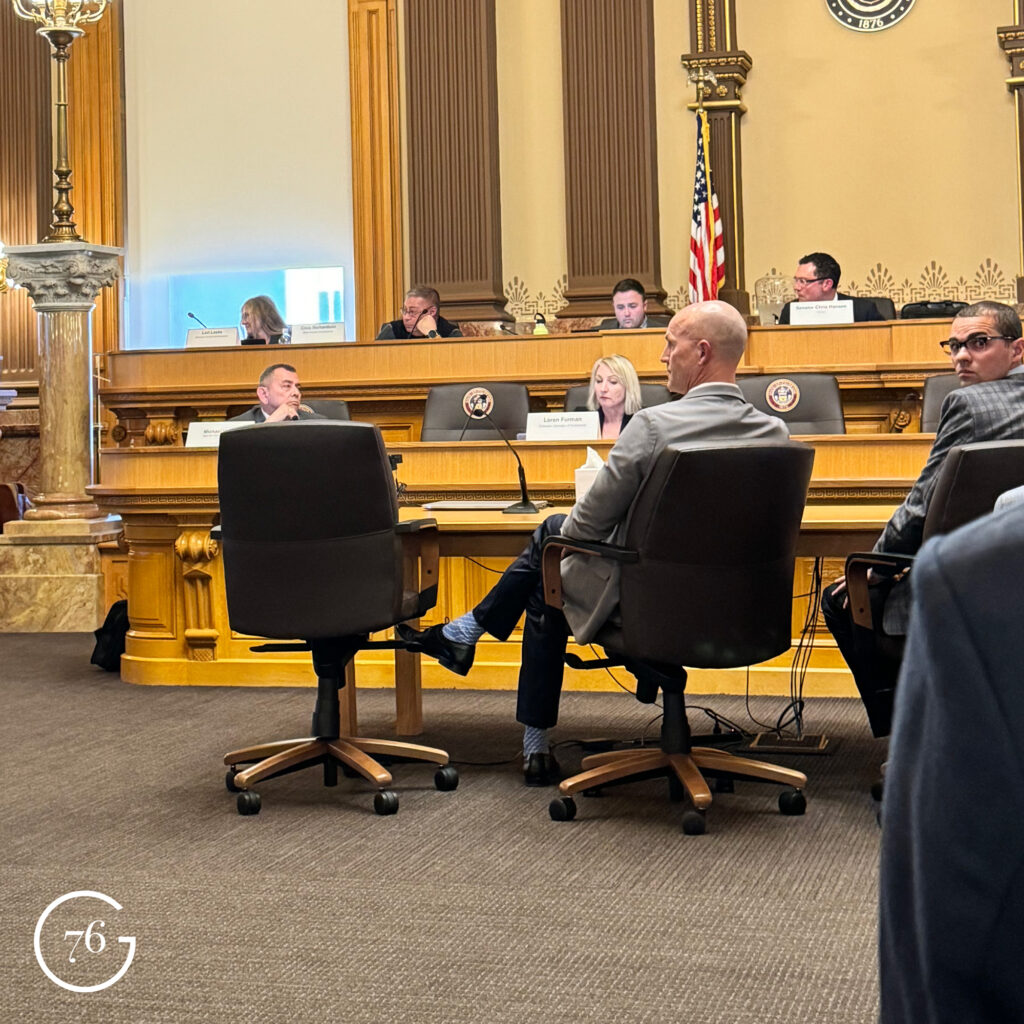
★ THE MOTHER LODE ★
A short, sweet, and rich summary of what’s happened at the Capitol
Nearly 540 bills have been introduced, marking the halfway point of the session. Certain bills are advancing more rapidly than others with a continued focus on housing, energy and public safety initiatives. At 76 Group, we’re rolling up our sleeves as we eagerly anticipate developments unfolding at the halfway mark of the session.
Legislators are prioritizing the urgent need to address the ongoing housing crisis. The Senate Finance Committee has approved Senate Bill 24-146, sponsored by Sens. Hansen and Kolker, which would provide tax credits to eligible renters. This bill allows qualifying taxpayers to claim either the income tax credit provided by the bill or another available tax credit, but not both.
Meanwhile, Senate Bill 24-106 focused on the Right to Remedy Construction Defects, was discussed extensively in the Senate Local Government & Housing Committee on March 5th, prompting a decision to postpone further consideration for refinement before proceeding. The bill clarifies the definition of a claimant in construction defect actions and establishes mechanisms for construction professionals to address claims through remedial work.

On the property tax front, former Senate Minority Leader Josh Penry testified before the Property Tax Commission on March 1st about the escalating burden of property taxes on Colorado residents. Urging immediate property tax reform, Penry laid the blame for the crisis at the feet of the lawmakers:
“The reality is that the reason we are here today is because the legislature has not acted,” he said.
Penry outlined a proposed ballot initiative featuring a threefold approach to property taxes: Rollback, Cap and Backfill. The measure reverts property tax rates back to their 2022 levels and caps future tax revenue growth at 4% unless state or local voters make a decision to exceed the cap. The backfill provision acknowledges the crucial role local districts play in serving community needs and provides for for additional funding beyond the 2022 levels plus 4%.
A mounting number of legislative proposals concerning the oil and gas sector are also emerging, many of which directly impede industry operations. Notable examples include Senate Bill 24-159, which advocates for a complete drilling ban by 2030, and Senate Bill 24-165, which seeks to restrict drilling activities between May and September. Additionally, House Bill 24-1339 proposes an expansion of the Air Quality Control Commission, increasing its membership from 9 to 11 people and introducing additional regulatory measures. Similarly, House Bill 24-1338 grants local governing bodies the authority to request the Air Quality Control Commission to impose limits on new or increased operational emissions of specific health-related air pollutants within their jurisdictional regions.

★ THE BILLFOLD ★
Updates on impactful legislation
House Bill 24-1338
Cumulative Impacts & Environmental Justice
By: Representatives Rutinel, Velasco
Status: Introduced in House – Assigned to Energy & Environment
Summary: On or after January 1, 2026, the elected officials of a city, town, county, or city and county (local governing body) to request that the air quality control commission (commission) impose limits on any new or increased operational emissions of certain health-related air pollutants that would affect individuals located in the geographic region governed by the local governing body.
House Bill 24-1339
Disproportionately Impact Community Air Pollution
By: Representative Rutinel, Weissman
Status: Introduced in House – Assigned to Energy & Environment
Summary: Under current law, the air quality control commission (commission) consists of 9 members. As of October 1, 2024, section 2 of the bill increases the membership of the commission to 11 members.
Senate Bill 24-033
Lodging Property Tax Treatment
By: Senator Hansen
Status: Introduced in Senate – Assigned to Finance
Summary: The bill establishes that, for property tax years commencing on or after January 1, 2026, a short-term rental unit, which is an improvement that is designated and used as a place of residency by a person, family, or families, but that is also leased for overnight lodging for less than 30 consecutive days in exchange for a monetary payment (short-term stay) and is not a primary residence, and the land upon which the improvement is located, may be classified as either residential real property or lodging property.
Senate Bill 24-124
Health-Care Coverage for Biomarker Testing
By: Senators Michaelson Jenet, Rich
Status: Introduced in Senate – Assigned to Health & Human Services
Summary: The bill requires all individual and group health benefit plans to provide coverage for biomarker testing to guide treatment decisions if the testing is supported by medical and scientific evidence.
Senate Bill 24-146
Tax Credit for Qualified Renters
By: Senator Hansen, Kolker
Status: Senate Committee on Finance Refer Amended to Appropriations
Summary: For the 2024 income tax year through the 2026 income tax year, the bill creates a nonrefundable income tax credit (credit), which cannot be carried forward, for a taxpayer who: Rents the taxpayer’s primary residence in the state; and Has a federal adjusted gross income (AGI) that is less than or equal to $75,000 if filing a single return, or less than or equal to $150,000 if filing a joint return (qualifying taxpayer).
Senate Bill 24-106
Right to Remedy Construction Defects
By: Senators Zenzinger, Coleman
Status: Introduced in Senate – Assigned to Local Government & Housing
Summary: The bill clarifies that a person that has had a claim brought on the person’s behalf is also considered a claimant, and therefore, the act applies to the person for whom the claim is brought. Sections 3 and 6 create a right for a construction professional to remedy a claim made against the construction professional by doing remedial work or hiring another construction professional to perform the work.

★ CRUMBS… ★
Insights by Karen Crummy, Principal, 76 Group
| Are you talking to the right people? Part I At the beginning of the legislative session, you teed up an expert lobbyist, put together a compelling narrative and created a list of sincere individuals to share their moving stories to lawmakers during bill hearings. That’s a great start. What many organizations, companies, nonprofits and coalitions advocating for or against legislation miss, however, is the importance of communicating to people outside of the Dome in order to impact policy change under the Dome. Public opinion informs political decision making, and outward pressure from targeted constituencies on legislators makes a difference because they care what their neighbors think and pride themselves on understanding the needs and concerns of their districts. |
| The way to leverage public opinion is to cover all your bases through an integrated communications and outreach plan that is innovatively tailored to your specific audiences. The old ways of robocalls and mass emails to lawmakers and one well-placed phone call don’t work. Your lobbyist needs backup from grasstops and grassroots coalitions that can speak publicly about the issues to generate attention and speak privately to decision makers to apply pressure. These various stakeholders personalize the issue and create the inflection points needed to bring about much-needed change or block irresponsible policy. By putting in the time to build a stakeholder map and recruit compelling messengers, you can strategically deploy your best influencers with the right message at the right time to the right audience. How do you effectively deliver that message? That’s for Part II. |

★ BUDGET BONANZA ★
All that’s happening with the Joint Budget Committee
The Joint Budget Committee of the legislature voted to include constitutionally required funding levels in the upcoming budget, marking a significant step forward. However, the final budget still requires approval from the full General Assembly in the following months. Additionally, Gov. Polis’ budget proposal in November included the elimination of the Budget Stabilizer Factor (BS Factor). By getting rid of the BS Factor, Colorado is now able to fully fund our schools according to the formula.

★ CAPITOL CHATTER ★
Press releases, news articles, and more
News Story – March 5, 2024 – Sum & Substance
Polis’ affordable-housing package gets big test beginning this week
News Story – March 7, 2024 – The Denver Post
Jena Griswold faces impeachment, recall bids by Colorado Republicans
News Story – March 1, 2024 – 9News
3 possible ballot initiatives to lower property taxes in Colorado
News Story – March 7, 2024 – Sum & Substance
First air-quality regulatory boost clears initial legislative committee
News Story – March 6, 2024 – Denver7
Lawmakers consider bills regarding construction defects, homeowner protections
News Story – March 16, 2024 – Denver Post
Colorado economic forecast gives rosy outlook, but legislators will have to juggle priorities in state budget

